Understanding Different Types of Circuit Breakers
Circuit breakers serve as crucial safety mechanisms designed to interrupt the flow of electricity within a circuit, safeguarding both the electrical system and connected devices from potential damage caused by overcurrents and short circuits. They play a vital role in various electrical setups, including residential, commercial, and industrial environments, ensuring the safety of users and equipment alike.
The primary purpose of a circuit breaker is to prevent the excessive flow of current in an electrical circuit, which could result in overheating, electrical fires, or harm to electrical components. When detecting an overcurrent or short circuit, a circuit breaker automatically opens the circuit, halting the electricity flow to shield the circuit and its components from harm by limiting the current.
Diverse types and sizes of circuit breakers are available, each tailored to specific applications and voltage requirements. They can be broadly classified into two main categories: low voltage (LV) and high voltage (HV) circuit breakers. LV circuit breakers are prevalent in residential and commercial settings, such as homes and offices, providing protection against overloads and short circuits. Conversely, HV circuit breakers are common in industrial settings, engineered to manage higher voltages typically present in manufacturing plants or utility infrastructure.
The functionality of a circuit breaker is based on fundamental yet sophisticated principles. Within the device lies a mechanism that reacts to the circuit's current-carrying capacity. Upon surpassing this capacity, a bimetallic strip heats up and bends, triggering an arm to open the circuit, disconnecting the contacts and halting the electricity flow. Depending on the type, the circuit breaker can be reset manually or automatically.
Varieties of Circuit Breakers
Various types of circuit breakers cater to distinct requirements across different applications. Below are some common varieties:
-
Miniature Circuit Breaker (MCB): Primarily used in residential and light commercial applications, MCBs offer protection against overcurrents and short circuits, with typical ratings up to 63 amps and easy reset capabilities.
-
Molded Case Circuit Breaker (MCCB): Suitable for demanding commercial and industrial applications, MCCBs can handle higher currents than MCBs, providing a higher breaking capacity and safeguarding larger circuits.
-
Residual Current Circuit Breaker (RCCB): Specifically designed to prevent electric shock by interrupting power supply upon detecting an imbalance in electrical currents.
-
Earth Leakage Circuit Breaker (ELCB): Utilized to open a circuit upon detecting leakage current, offering protection against electric shock, commonly found in older installations and specialized applications.
-
Overload Relays: Although not circuit breakers per se, overload relays protect equipment from overheating by monitoring current and opening the circuit if an overload is detected, frequently used in motor protection scenarios.
Choosing the Right Circuit Breakers
Selecting the appropriate circuit breaker is vital for ensuring safety and efficiency within an electrical system. When making a purchase decision on Alibaba.com for your business requirements, evaluating factors such as voltage level, current magnitude, environmental conditions, and specific application needs is essential.
Begin by determining the voltage rating suitable for your system, as it dictates the necessity for a low-voltage (LV), medium-voltage (MV), high-voltage (HV), or ultra-high-voltage (UHV) breaker to prevent equipment failure or fires.
Next, assess the circuit breaker's current-carrying capacity, often aligned with the system's main circuit rating voltage requirement, ensuring it can handle the maximum current without tripping prematurely or causing operational disruptions.
Consider the environmental conditions of the installation site; for outdoor or high-moisture locations, opt for a robust, possibly waterproof breaker design.
Lastly, factor in specific application requirements, whether for an industrial plant, hotel, solar installation, or household appliances, as different breaker types offer various advantages, such as space-saving features for commercial settings or enhanced protection for specialized applications like food establishments.
Alibaba.com's Circuit Breaker Offerings
Alibaba.com serves as a global marketplace linking businesses with a wide array of suppliers offering diverse circuit breakers suitable for various applications. Since its establishment in 1999, Alibaba.com has been a frontrunner in facilitating B2B transactions across over 190 countries, providing a platform for businesses to access nearly every product necessary to maintain seamless operations. With an extensive selection from global suppliers, Alibaba.com simplifies the process for businesses to procure high-quality circuit protection devices tailored to their needs.
The platform's user-friendly interface streamlines product searches through advanced filters based on protection level, industry application, number of poles, material composition, and more. This targeted approach ensures that businesses can find products aligning with their technical requirements effortlessly.
Moreover, Alibaba.com offers Trade Assurance, enhancing buyer confidence by securing payments until order fulfillment is confirmed. This commitment to secure transactions underscores Alibaba's dedication to serving businesses with reliability and integrity. Whether seeking miniature circuit breakers for electronics or robust solutions like high-voltage circuit breakers for utility setups, Alibaba.com provides a convenient platform to explore options from trusted suppliers worldwide, transcending geographical constraints.
FAQs on Circuit Breakers
What types of circuit breakers are suitable for industrial use?
Industrial-grade circuit breakers are tailored for high-voltage and high-current applications, including motor control, power distribution, and heavy machinery operations. They encompass molded case circuit breakers (MCCBs), miniature circuit breakers (MCBs), and air circuit breakers (ACBs), each offering specific features to meet diverse industrial needs.
How do I select the appropriate circuit breaker material for my business?
Consider your business environment and demands. Copper circuit breakers are ideal for applications requiring good electrical conductivity, commonly used in power distribution systems, whereas ABS or plastic circuit breakers may suffice for less demanding environments.
Can circuit breakers be used in both AC and DC applications?
Yes, specific circuit breakers are designed for either alternating current (AC) or direct current (DC) applications. It is crucial to choose a breaker compatible with the system's current and voltage specifications.
What does the 'number of poles' specification signify in circuit breakers?
The 'number of poles' specification indicates the configuration of the circuit breaker, denoting the count of conductive elements within the switch or similar control device. It may range from 1 to 4, correlating with the available connection options.
How does the protection level impact the circuit breaker selection?
The protection level determines the circuit breaker's resilience to various forms of damage. Aligning the protection level with the application's potential risks is crucial to ensuring the electrical system's safety and durability.
Are there circuit breakers with remote operation capabilities?
Indeed, circuit breakers with remote operation capabilities are available. Particularly advantageous in industrial settings, these breakers enable quick access for maintenance or repair without the need for physical manipulation.
What features should I consider in a circuit breaker for a hotel or hospitality setting?
For hotel or hospitality applications, prioritize circuit breakers offering electrical safety and the capacity to manage power surges. Features like overcurrent protection and user-friendly operation are vital due to fluctuating guest numbers and electrical load variations.
How do I choose a circuit breaker based on the applicable local service regulations in the industry?
Select a circuit breaker compliant with the local service regulations and environmental conditions specific to your industry. Ensure the voltage rating and breaking capacity adhere to the standards pertinent to your region.
Can I find customized circuit breakers for unique applications?
Suppliers on Alibaba.com may offer tailored solutions to meet your unique operational needs, such as specific voltage ratings, specialized protective features, or unique applications.
What do 'on-off' and 'function' signify regarding circuit breakers?
'On-off' denotes whether a circuit breaker is in an open (off) or closed (on) position. 'Function' indicates whether a circuit breaker is energized (on) or not (off), similar to a light switch's state.
How is the 'material' specification relevant in the context of circuit breakers?
The 'material' specification pertains to the construction material of the circuit breaker, encompassing components made from materials like copper, ABS, or steel. The choice of material impacts the durability and performance characteristics of the circuit breaker.
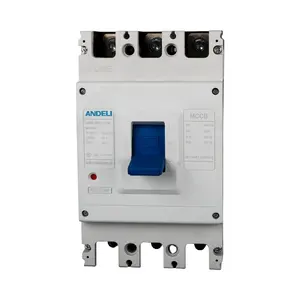




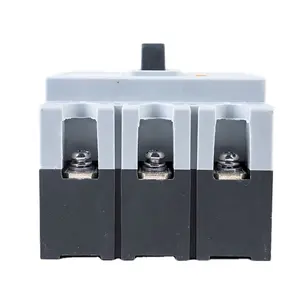







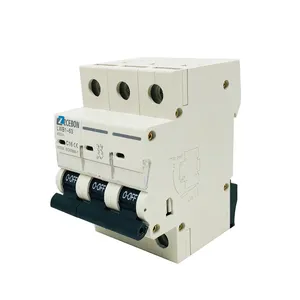


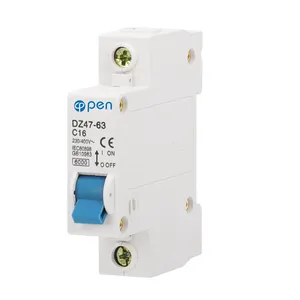


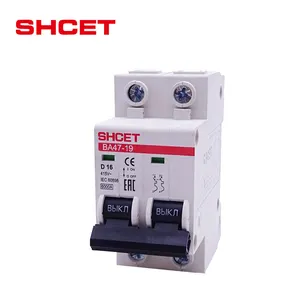


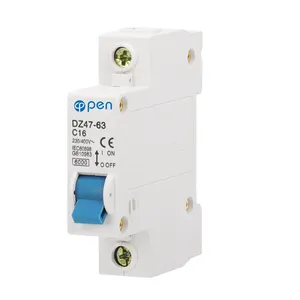



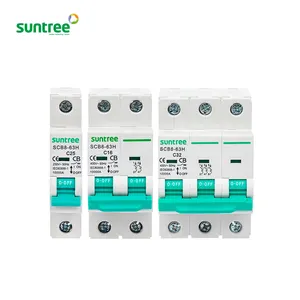
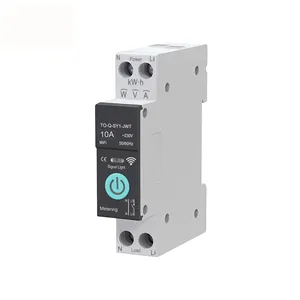

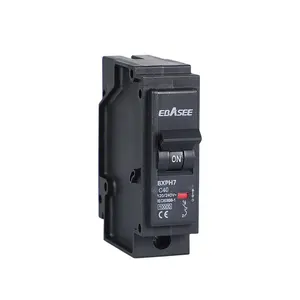

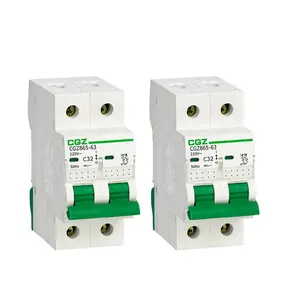





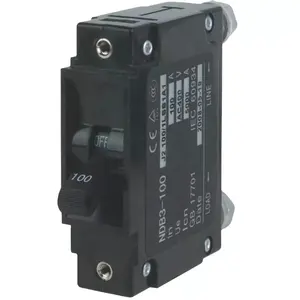
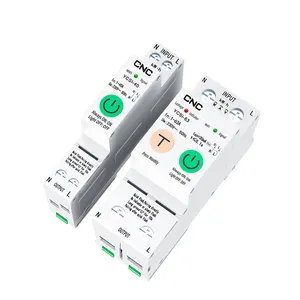
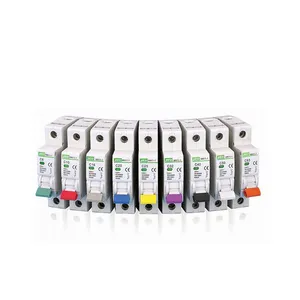







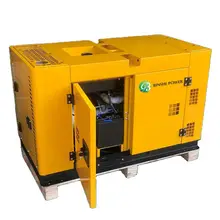


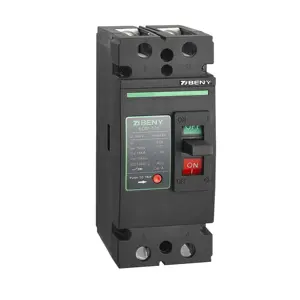





















 浙公网安备 33010002000092号
浙公网安备 33010002000092号 浙B2-20120091-4
浙B2-20120091-4